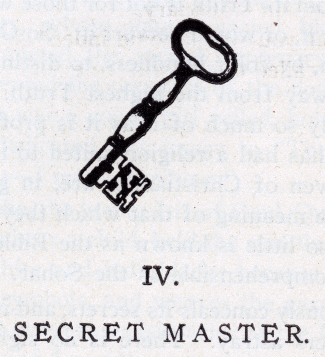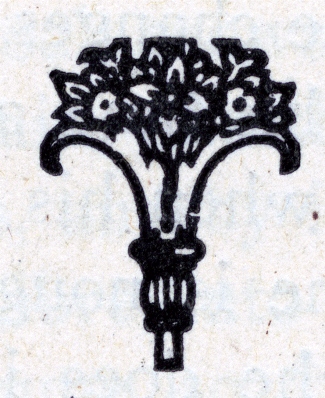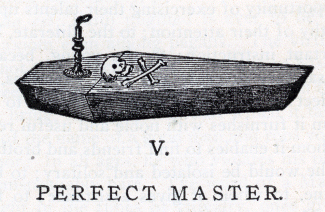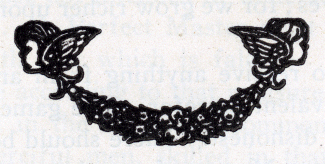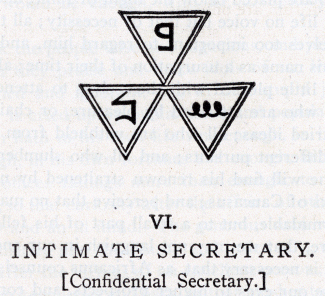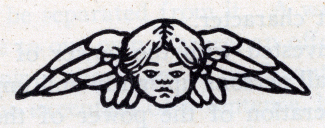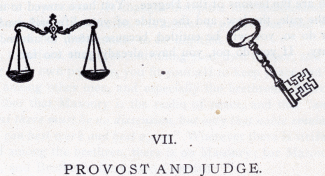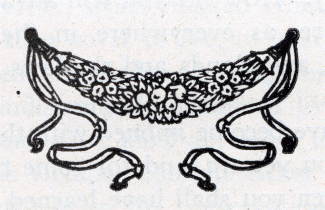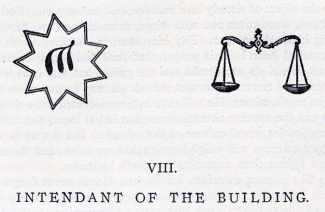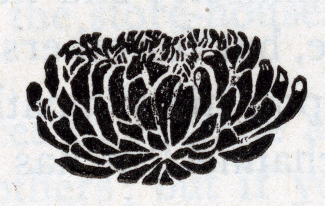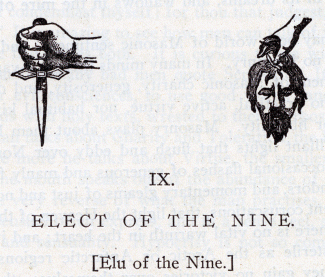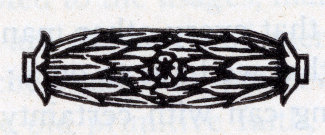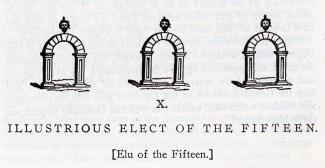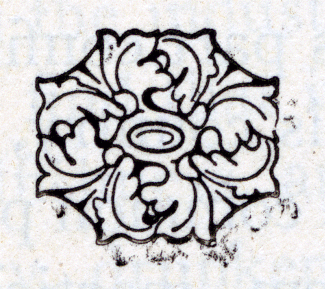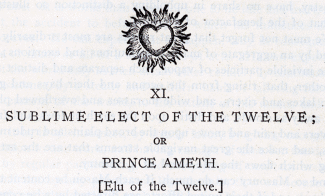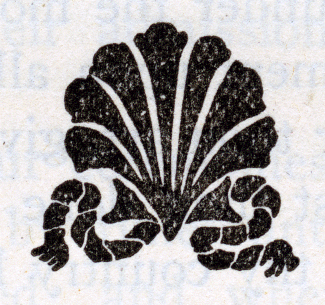III. THE MASTER
To understand literally the symbols and allegories of Oriental books as to ante-historical matters, is willfully to close our eyes against the Light. To translate the symbols into the trivial and commonplace, is the blundering of mediocrity.
All religious expression is symbolism; since we can describe only what we see, and the true objects of religion are THE SEEN. The earliest instruments of education were symbols; and they and all other religious forms differed and still differ according to external circumstances and imagery, and according to differences of knowledge and mental cultivation. All language is symbolic, so far as it is applied to mental and spiritual phenomena and action. All words have, primarily, a material sense, however they may afterward get, for the ignorant, a spiritual non-sense. "To retract," for example, is to draw back, and when applied to a statement, is symbolic, as much so as a picture of an arm drawn back, to express the same thing, would be. The very word "spirit" means "breath," from the Latin verb spiro, breathe.
To present a visible symbol to the eye of another is not necessarily to inform him of the meaning which that symbol has to you. Hence the philosopher soon superadded to the symbols explanations addressed to the ear, susceptible of more precision, but less effective and impressive than the painted or sculptured forms which he endeavored to explain. Out of these explanations grew by degrees a variety of narrations, whose true object and meaning were gradually forgotten, or lost in contradictions and incongruities. And when these were abandoned, and Philosophy resorted to definitions and formulas, its language was but a more complicated symbolism, attempting in the dark to grapple with and picture ideas impossible to be expressed. For as with the visible symbol, so with the word: to utter it to you does not inform you of the exact meaning which it has to me; and thus religion and philosophy became to a great extent disputes as to the meaning of words. The most abstract expression for DEITY, which language can supply, is but a sign or symbol for an object beyond our comprehension, and not more truthful and adequate than the images of OSIRIS and VISHNU, or their names, except as being less sensuous and explicit. We avoid sensuousness only by resorting to simple negation. We come at last to define spirit by saying that it is not matter. Spirit is--spirit.
A single example of the symbolism of words will indicate to you one branch of Masonic study. We find in the English Rite this phrase: "I will always hail, ever conceal, and never reveal;" and in the Catechism, these:
Q∴ "I hail."
A∴ "I conceal;"
and ignorance, misunderstanding the word "hail," has interpolated the phrase, "From whence do you hail!'"
But the word is really "hele," from the Anglo-Saxon verb
 elan, helan, to cover, hide, or conceal. And this word is rendered by the Latin verb tegere, to cover or roof over. "That ye fro me no thynge woll hele," says Gower. "They hele fro me no priuyte," says the Romaunt of the Rose. "To heal a house," is a common phrase in Sussex; and in the west of England, he that covers a house with slates is called a Healer. Wherefore, to "heal" means the same thing as to "tile,"--itself symbolic, as meaning, primarily, to cover a house with tiles,--and means to cover, hide, or conceal. Thus language too is symbolism, and words are as much misunderstood and misused as more material symbols are.
elan, helan, to cover, hide, or conceal. And this word is rendered by the Latin verb tegere, to cover or roof over. "That ye fro me no thynge woll hele," says Gower. "They hele fro me no priuyte," says the Romaunt of the Rose. "To heal a house," is a common phrase in Sussex; and in the west of England, he that covers a house with slates is called a Healer. Wherefore, to "heal" means the same thing as to "tile,"--itself symbolic, as meaning, primarily, to cover a house with tiles,--and means to cover, hide, or conceal. Thus language too is symbolism, and words are as much misunderstood and misused as more material symbols are.Symbolism tended continually to become more complicated; and all the powers of Heaven were reproduced on earth, until a web of fiction and allegory was woven, partly by art and partly by the ignorance of error, which the wit of man, with his limited means of explanation, will never unravel. Even the Hebrew Theism became involved in symbolism and image-worship, borrowed probably from an older creed and remote regions of Asia,--the worship of the Great Semitic Nature-God AL or ELS and its symbolical representations of JEHOVAH Himself were not even confined to poetical or illustrative language. The priests were monotheists: the people idolaters.
There are dangers inseparable from symbolism, which afford an impressive lesson in regard to the similar risks attendant on the use of language. The imagination, called in to assist the reason, usurps its place or leaves its ally helplessly entangled in its web. Names which stand for things are confounded with them; the means are mistaken for the end; the instrument of interpretation for the object; and thus symbols come to usurp an independent character as truths and persons. Though perhaps a necessary path, they were a dangerous one by which to approach the Deity; in which many, says PLUTARCH, "mistaking the sign for the thing signified, fell into a ridiculous superstition; while others, in avoiding one extreme, plunged into the no less hideous gulf of irreligion and impiety."
It is through the Mysteries, CICERO says, that we have learned the first principles of life; wherefore the term "initiation" is used with good reason; and they not only teach us to live more happily and agreeably, but they soften the pains of death by the hope of a better life hereafter.
The Mysteries were a Sacred Drama, exhibiting some legend significant of nature's changes, of the visible Universe in which the Divinity is revealed, and whose import was in many respects as open to the Pagan as to the Christian. Nature is the great Teacher of man; for it is the Revelation of God. It neither dogmatizes nor attempts to tyrannize by compelling to a particular creed or special interpretation. It presents its symbols to us, and adds nothing by way of explanation. It is the text without the commentary; and, as we well know, it is chiefly the commentary and gloss that lead to error and heresy and persecution. The earliest instructors of mankind not only adopted the lessons of Nature, but as far as possible adhered to her method of imparting them. In the Mysteries, beyond the current traditions or sacred and enigmatic recitals of the Temples, few explanations were given to the spectators, who were left, as in the school of nature, to make inferences for themselves. No other method could have suited every degree of cultivation and capacity. To employ nature's universal symbolism instead of the technicalities of language, rewards the humblest inquirer, and discloses its secrets to every one in proportion to his preparatory training and his power to comprehend them. If their philosophical meaning was above the comprehension of some, their moral and political meanings are within the reach of all.
These mystic shows and performances were not the reading of a lecture, but the opening of a problem. Requiring research, they were calculated to arouse the dormant intellect. They implied no hostility to Philosophy, because Philosophy is the great expounder of symbolism; although its ancient interpretations were often ill-founded and incorrect. The alteration from symbol to dogma is fatal to beauty of expression, and leads to intolerance and assumed infallibility.
***
If, in teaching the great doctrine of the divine nature. of the Soul, and in striving to explain its longings after immortality, and in proving its superiority over the souls of the animals, which have no aspirations Heavenward, the ancients struggled in vain to express the nature of the soul, by comparing it to FIRE and LIGHT, it will be well for us to consider whether, with all our boasted knowledge, we have any better or clearer idea of its nature, and whether we have not despairingly taken refuge in having none at all. And if they erred as to its original place of abode, and understood literally the mode and path of its descent, these were but the accessories of the great Truth, and probably, to the Initiates, mere allegories, designed to make the idea more palpable and impressive to the mind.
They are at least no more fit to be smiled at by the self-conceit of a vain ignorance, the wealth of whose knowledge consists solely in words, than the bosom of Abraham, as a home for the spirits of the just dead; the gulf of actual fire, for the eternal torture of spirits; and the City of the New Jerusalem, with its walls of jasper and its edifices of pure gold like clear glass, its foundations of precious stones, and its gates each of a single pearl. "I knew a man," says PAUL, "caught up to the third Heaven; . . . . that he was caught up into Paradise, and heard ineffable words, which it is not possible for a man to utter." And nowhere is the antagonism and conflict between the spirit and body more frequently and forcibly insisted on than in the writings of this apostle, nowhere the Divine nature of the soul more strongly asserted. "With the mind," he says, "I serve the law of God; but with the flesh the law of sin. . . .As many as are led by the Spirit of God, are the sons of GOD.... The earnest expectation of the created waits for the manifestation of the sons of God. . . . The created shall be delivered from the bondage of corruption, of the flesh liable to decay, into the glorious liberty of the children of God."
***
Two forms of government are favorable to the prevalence of falsehood and deceit. Under a Despotism, men are false, treacherous, and deceitful through fear, like slaves dreading the lash. Under a Democracy they are so as a means of attaining popularity and office, and because of the greed for wealth. Experience will probably prove that these odious and detestable vices will grow most rankly and spread most rapidly in a Republic. When office and wealth become the gods of a people, and the most unworthy and unfit most aspire to the former, and fraud becomes the highway to the latter, the land will reek with falsehood and sweat lies and chicane. When the offices are open to all, merit and stern integrity and the dignity of unsullied honor will attain them only rarely and by accident. To be able to serve the country well, will cease to be a reason why the great and wise and learned should be selected to render service. Other qualifications, less honorable, will be more available. To adapt one's opinions to the popular humor; to defend, apologize for, and justify the popular follies; to advocate the expedient and the plausible; to caress, cajole, and flatter the elector; to beg like a spaniel for his vote, even if he be a negro three removes from barbarism; to profess friendship for a competitor and stab him by innuendo; to set on foot that which at third hand shall become a lie, being cousin-german to it when uttered, and yet capable of being explained away,--who is there that has not seen these low arts and base appliances put into practice, and becoming general, until success cannot be surely had by any more honorable means?--the result being a State ruled and ruined by ignorant and shallow mediocrity, pert self-conceit, the greenness of unripe intellect, vain of a school-boy's smattering of knowledge.
The faithless and the false in public and in political life, will be faithless and false in private. The jockey in politics, like the jockey on the race-course, is rotten from skin to core. Everywhere he will see first to his own interests, and whoso leans on him will be pierced with a broken reed. His ambition is ignoble, like himself; and therefore he will seek to attain office by ignoble means, as he will seek to attain any other coveted object,--land, money, or reputation.
At length, office and honor are divorced. The place that the small and shallow, the knave or the trickster, is deemed competent and fit to fill, ceases to be worthy the ambition of the great and capable; or if not, these shrink from a contest, the weapons to be used wherein are unfit for a gentleman to handle. Then the habits of unprincipled advocates in law courts are naturalized in Senates, and pettifoggers wrangle there, when the fate of the nation and the lives of millions are at stake. States are even begotten by villainy and brought forth by fraud, and rascalities are justified by legislators claiming to be honorable. Then contested elections are decided by perjured votes or party considerations; and all the practices of the worst times of corruption are revived and exaggerated in Republics.
It is strange that reverence for truth, that manliness and genuine loyalty, and scorn of littleness and unfair advantage, and genuine faith and godliness and large-heartedness should diminish, among statesmen and people, as civilization advances, and freedom becomes more general, and universal suffrage implies universal worth and fitness! In the age of Elizabeth, without universal suffrage, or Societies for the Diffusion of Useful Knowledge, or popular lecturers, or Lycæa, the statesman, the merchant, the burgher, the sailor, were all alike heroic, fearing God only, and man not at all. Let but a hundred or two years elapse, and in a Monarchy or Republic of the same race, nothing is less heroic than the merchant, the shrewd speculator, the office-seeker, fearing man only, and God not at all. Reverence for greatness dies out, and is succeeded by base envy of greatness. Every man is in the way of many, either in the path to popularity or wealth. There is a general feeling of satisfaction when a great statesman is displaced, or a general, who has been for his brief hour the popular idol, is unfortunate and sinks from his high estate. It becomes a misfortune, if not a crime, to be above the popular level.
We should naturally suppose that a nation in distress would take counsel with the wisest of its sons. But, on the contrary, great men seem never so scarce as when they are most needed, and small men never so bold to insist on infesting place, as when mediocrity and incapable pretence and sophomoric greenness, and showy and sprightly incompetency are most dangerous. When France was in the extremity of revolutionary agony, she was governed by an assembly of provincial pettifoggers, and Robespierre, Marat, and Couthon ruled in the place of Mirabeau, Vergniaud, and Carnot. England was governed by the Rump Parliament, after she had beheaded her king. Cromwell extinguished one body, and Napoleon the other.
Fraud, falsehood, trickery, and deceit in national affairs are the signs of decadence in States and precede convulsions or paralysis. To bully the weak and crouch to the strong, is the policy of nations governed by small mediocrity. The tricks of the canvass for office are re-enacted in Senates. The Executive becomes the dispenser of patronage, chiefly to the most unworthy; and men are bribed with offices instead of money, to the greater ruin of the Commonwealth. The Divine in human nature disappears, and interest, greed, and selfishness takes it place. That is a sad and true allegory which represents the companions of Ulysses changed by the enchantments of Circe into swine.
***
"Ye cannot," said the Great Teacher, "serve God and Mammon." When the thirst for wealth becomes general, it will be sought for as well dishonestly as honestly; by frauds and overreachings, by the knaveries of trade, the heartlessness of greedy speculation, by gambling in stocks and commodities that soon demoralizes a whole community. Men will speculate upon the needs of their neighbors and the distresses of their country. Bubbles that, bursting, impoverish multitudes, will be blown up by cunning knavery, with stupid credulity as its assistants and instrument. Huge bankruptcies, that startle a country like the earth-quakes, and are more fatal, fraudulent assignments, engulfment of the savings of the poor, expansions and collapses of the currency, the crash of banks, the depreciation of Government securities, prey on the savings of self-denial, and trouble with their depredations the first nourishment of infancy and the last sands of life, and fill with inmates the churchyards and lunatic asylums. But the sharper and speculator thrives and fattens. If his country is fighting by a levy en masse for her very existence, he aids her by depreciating her paper, so that he may accumulate fabulous amounts with little outlay. If his neighbor is distressed, he buys his property for a song. If he administers upon an estate, it turns out insolvent, and the orphans are paupers. If his bank explodes, he is found to have taken care of himself in time. Society worships its paper-and-credit kings, as the old Hindus and Egyptians worshipped their worthless idols, and often the most obsequiously when in actual solid wealth they are the veriest paupers. No wonder men think there ought to be another world, in which the injustices of this may be atoned for, when they see the friends of ruined families begging the wealthy sharpers to give alms to prevent the orphaned victims from starving, until they may find ways of supporting themselves.
***
States are chiefly avaricious of commerce and of territory. The latter leads to the violation of treaties, encroachments upon feeble neighbors, and rapacity toward their wards whose lands are coveted. Republics are, in this, as rapacious and unprincipled as Despots, never learning from history that inordinate expansion by rapine and fraud has its inevitable consequences in dismemberment or subjugation. When a Republic begins to plunder its neighbors, the words of doom are already written on its walls. There is a judgment already pronounced of God upon whatever is unrighteous in the conduct of national affairs. When civil war tears the vitals of a Republic, let it look back and see if it has not been guilty of injustices; and if it has, let it humble itself in the dust!
When a nation becomes possessed with a spirit of commercial greed, beyond those just and fair limits set by a due regard to a moderate and reasonable degree of general and individual prosperity, it is a nation possessed by the devil of commercial avarice, a passion as ignoble and demoralizing as avarice in the individual; and as this sordid passion is baser and more unscrupulous than ambition, so it is more hateful, and at last makes the infected nation to be regarded as the enemy of the human race. To grasp at the lion's share of commerce, has always at last proven the ruin of States, because it invariably leads to injustices that make a State detestable; to a selfishness and crooked policy that forbid other nations to be the friends of a State that cares only for itself.
Commercial avarice in India was the parent of more atrocities and greater rapacity, and cost more human lives, than the nobler ambition for extended empire of Consular Rome. The nation that grasps at the commerce of the world cannot but become selfish, calculating, dead to the noblest impulses and sympathies which ought to actuate States. It will submit to insults that wound its honor, rather than endanger its commercial interests by war; while, to subserve those interests, it will wage unjust war, on false or frivolous pretexts, its free people cheerfully allying themselves with despots to crush a commercial rival that has dared to exile its kings and elect its own ruler.
Thus the cold calculations of a sordid self-interest, in nations commercially avaricious, always at last displace the sentiments and lofty impulses of Honor and Generosity by which they rose to greatness; which made Elizabeth and Cromwell alike the protectors of Protestants beyond the four seas of England, against crowned Tyranny and mitred Persecution; and, if they had lasted, would have forbidden alliances with Czars and Autocrats and Bourbons to re-enthrone the Tyrannies of Incapacity, and arm the Inquisition anew with its instruments of torture. The soul of the avaricious nation petrifies, like the soul of the individual who makes gold his god. The Despot will occasionally act upon noble and generous impulses, and help the weak against the strong, the right against the wrong. But commercial avarice is essentially egotistic, grasping, faithless, overreaching, crafty, cold, ungenerous, selfish, and calculating, controlled by considerations of self-interest alone. Heartless and merciless, it has no sentiments of pity, sympathy, or honor, to make it pause in its remorseless career; and it crushes down all that is of impediment in its way, as its keels of commerce crush under them the murmuring and unheeded waves.
A war for a great principle ennobles a nation. A war for commercial supremacy, upon some shallow pretext, is despicable, and more than aught else demonstrates to what immeasurable depths of baseness men and nations can descend. Commercial greed values the lives of men no more than it values the lives of ants. The slave-trade is as acceptable to a people enthralled by that greed, as the trade in ivory or spices, if the profits are as large. It will by-and-by endeavor to compound with God and quiet its own conscience, by compelling those to whom it sold the slaves it bought or stole, to set them free, and slaughtering them by hecatombs if they refuse to obey the edicts of its philanthropy.
Justice in no wise consists in meting out to another that exact measure of reward or punishment which we think and decree his merit, or what we call his crime, which is more often merely his error, deserves. The justice of the father is not incompatible with forgiveness by him of the errors and offences of his child. The Infinite Justice of God does not consist in meting out exact measures of punishment for human frailties and sins. We are too apt to erect our own little and narrow notions of what is right and just into the law of justice, and to insist that God shall adopt that as His law; to measure off something with our own little tape-line, and call it God's love of justice. Continually we seek to ennoble our own ignoble love of revenge and retaliation, by misnaming it justice.
Nor does justice consist in strictly governing our conduct toward other men by the rigid rules of legal right. If there were a community anywhere, in which all stood upon the strictness of this rule, there should be written over its gates, as a warning to the unfortunates desiring admission to that inhospitable realm, the words which DANTE says are written over the great gate of Hell: "LET THOSE WHO ENTER HERE LEAVE HOPE BEHIND!" It is not just to pay the laborer in field or factory or workshop his current wages and no more, the lowest market-value of his labor, for so long only as we need that labor and he is able to work; for when sickness or old age overtakes him, that is to leave him and his family to starve; and God will curse with calamity the people in which the children of the laborer out of work eat the boiled grass of the field, and mothers strangle their children, that they may buy food for themselves with the charitable pittance given for burial expenses. The rules of what is ordinarily termed "Justice," may be punctiliously observed among the fallen spirits that are the aristocracy of Hell.
***
Justice, divorced from sympathy, is selfish indifference, not in the least more laudable than misanthropic isolation. There is sympathy even among the hair-like oscillatorias, a tribe of simple plants, armies of which may be discovered, with the aid of the microscope, in the tiniest bit of scum from a stagnant pool. For these will place themselves, as if it were by agreement, in separate companies, on the side of a vessel containing them, and seem marching upward in rows; and when a swarm grows weary of its situation, and has a mind to change its quarters, each army holds on its way without confusion or intermixture, proceeding with great regularity and order, as if under the directions of wise leaders. The ants and bees give each other mutual assistance, beyond what is required by that which human creatures are apt to regard as the strict law of justice.
Surely we need but reflect a little, to be convinced that the individual man is but a fraction of the unit of society, and that he is indissolubly connected with the rest of his race. Not only the actions, but the will and thoughts of other men make or mar his fortunes, control his destinies, are unto him life or death, dishonor or honor. The epidemics, physical and moral, contagious and infectious, public opinion, popular delusions, enthusiasms, and the other great electric phenomena and currents, moral and intellectual, prove the universal sympathy. The vote of a single and obscure man, the utterance of self-will, ignorance, conceit, or spite, deciding an election and placing Folly or Incapacity or Baseness in a Senate, involves the country in war, sweeps away our fortunes, slaughters our sons, renders the labors of a life unavailing, and pushes on, helpless, with all our intellect to resist, into the grave.
These considerations ought to teach us that justice to others and to ourselves is the same; that we cannot define our duties by mathematical lines ruled by the square, but must fill with them the great circle traced by the compasses; that the circle of humanity is the limit, and we are but the point in its centre, the drops in the great Atlantic, the atom or particle, bound by a mysterious law of attraction which we term sympathy to every other atom in the mass; that the physical and moral welfare of others cannot be indifferent to us; that we have a direct and immediate interest in the public morality and popular intelligence, in the well-being and physical comfort of the people at large. The ignorance of the people, their pauperism and destitution, and consequent degradation, their brutalization and demoralization, are all diseases; and we cannot rise high enough above the people, nor shut ourselves up from them enough, to escape the miasmatic contagion and the great magnetic currents.
Justice is peculiarly indispensable to nations. The unjust State is doomed of God to calamity and ruin. This is the teaching of the Eternal Wisdom and of history. "Righteousness exalteth a nation; but wrong is a reproach to nations." "The Throne is established by Righteousness. Let the lips of the Ruler pronounce the sentence that is Divine; and his mouth do no wrong in judgment!" The nation that adds province to province by fraud and violence, that encroaches on the weak and plunders its wards, and violates its treaties and the obligation of its contracts, and for the law of honor and fair-dealing substitutes the exigencies of greed and the base precepts of policy and craft and the ignoble tenets of expediency, is predestined to destruction; for here, as with the individual, the consequences of wrong are inevitable and eternal.
A sentence is written against all that is unjust, written by God in the nature of man and in the nature of the Universe, because it is in the nature of the Infinite God. No wrong is really successful. The gain of injustice is a loss; its pleasure, suffering. Iniquity often seems to prosper, but its success is its defeat and shame. If its consequences pass by the doer, they fall upon and crush his children. It is a philosophical, physical, and moral truth, in the form of a threat, that God visits the iniquity of the fathers upon the children, to the third and fourth generation of those who violate His laws. After a long while, the day of reckoning always comes, to nation as to individual; and always the knave deceives himself, and proves a failure.
Hypocrisy is the homage that vice and wrong pay to virtue and justice. It is .Satan attempting to clothe himself in the angelic vesture of light. It is equally detestable in morals, politics, and religion; in the man and in the nation. To do injustice under the pretence of equity and fairness; to reprove vice in public and commit it in private; to pretend to charitable opinion and censoriously condemn; to profess the principles of Masonic beneficence, and close the ear to the wail of distress and the cry of suffering; to eulogize the intelligence of the people, and plot to deceive and be-tray them by means of their ignorance and simplicity; to prate of purity, and peculate; of honor, and basely abandon a sinking cause; of disinterestedness, and sell one's vote for place and power, are hypocrisies as common as they are infamous and disgraceful. To steal the livery of the Court of God to serve the Devil withal; to pretend to believe in a God of mercy and a Redeemer of love, and persecute those of a different faith; to devour widows' houses, and for a pretence make long prayers; to preach continence, and wallow in lust; to inculcate humility, and in pride surpass Lucifer; to pay tithe, and omit the weightier matters of the law, judgment, mercy and faith; to strain at a gnat, and swallow a camel; to make clean the outside of the cup and platter, keeping them full within of extortion and excess; to appear outwardly righteous unto men, but within be full of hypocrisy and iniquity, is indeed to be like unto whited sepulchres, which appear beautiful outward, but are within full of bones of the dead and of all uncleanness.
The Republic cloaks its ambition with the pretence of a desire and duty to "extend the area of freedom," and claims it as its "manifest destiny" to annex other Republics or the States or Provinces of others to itself, by open violence, or under obsolete, empty, and fraudulent titles. The Empire founded by a successful soldier, claims its ancient or natural boundaries, and makes necessity and its safety the plea for open robbery. The great Merchant Nation, gaining foothold in the Orient, finds a continual necessity for extending its dominion by arms, and subjugates India. The great Royalties and Despotisms, without a plea, partition among themselves a Kingdom, dismember Poland, and prepare to wrangle over the dominions of the Crescent. To maintain the balance of power is a plea for the obliteration of States. Carthage, Genoa, and Venice, commercial Cities only, must acquire territory by force or fraud, and become States. Alexander marches to the Indus; Tamerlane seeks universal empire; the Saracens conquer Spain and threaten Vienna.
The thirst for power is never satisfied. It is insatiable. Neither men nor nations ever have power enough. When Rome was the mistress of the world, the Emperors caused themselves to be worshipped as gods. The Church of Rome claimed despotism over the soul, and over the whole life from the cradle to the grave. It gave and sold absolutions for past and future sins. It claimed to be infallible in matters of faith. It decimated Europe to purge it of heretics. It decimated America to convert the Mexicans and Peruvians. It gave and took away thrones; and by excommunication and interdict closed the gates of Paradise against Nations, Spain, haughty with its dominion over the Indies, endeavored to crush out Protestantism in the Netherlands, while Philip the Second married the Queen of England, and the pair sought to win that kingdom back to its allegiance to the Papal throne. After-ward Spain attempted to conquer it with her "invincible" Armada. Napoleon set his relatives and captains on thrones, and parcelled among them half of Europe. The Czar rules over an empire more gigantic than Rome. The history of all is or will be the same,--acquisition, dismemberment, ruin. There is a judgment of God against all that is unjust.
To seek to subjugate the will of others and take the soul captive, because it is the exercise of the highest power, seems to be the highest object of human ambition. It is at the bottom of all proselyting and propagandism, from that of Mesmer to that of the Church of Rome and the French Republic. That was the apostolate alike of Joshua and of Mahomet. Masonry alone preaches Toleration, the right of man to abide by his own faith, the right of all States to govern themselves. It rebukes alike the monarch who seeks to extend his dominions by conquest, the Church that claims the right to repress heresy by fire and steel, and the confederation of States that insist on maintaining a union by force and restoring brotherhood by slaughter and subjugation.
It is natural, when we are wronged, to desire revenge; and to persuade ourselves that we desire it less for our own satisfaction than to prevent a repetition of the wrong, to which the doer would be encouraged by immunity coupled with the profit of the wrong. To submit to be cheated is to encourage the cheater to continue; and we are quite apt to regard ourselves as God's chosen instruments to inflict His vengeance, and for Him and in His stead to discourage wrong by making it fruitless and its punishment sure. Revenge has been said to be "a kind of wild justice;" but it is always taken in anger, and therefore is unworthy of a great soul, which ought not to suffer its equanimity to be disturbed by ingratitude or villainy. The injuries done us by the base are as much unworthy of our angry notice as those done us by the insects and the beasts; and when we crush the adder, or slay the wolf or hyena, we should do it without being moved to anger, and with no more feeling of revenge than we have in rooting up a noxious weed.
And if it be not in human nature not to take revenge by way of punishment, let the Mason truly consider that in doing so he is God's agent, and so let his revenge be measured by justice and tempered by mercy. The law of God is, that the consequences of wrong and cruelty and crime shall be their punishment; and the injured and the wronged and the indignant are as much His instruments to enforce that law, as the diseases and public detestation, and the verdict of history and the execration of posterity are. No one will say that the Inquisitor who has racked and burned the innocent; the Spaniard who hewed Indian infants, living, into pieces with his sword, and fed the mangled limbs to his blood-hounds; the military tyrant who has shot men without trial, the knave who has robbed or betrayed his State, the fraudulent banker or bankrupt who has beggared orphans, the public officer who has violated his oath, the judge who has sold injustice, the legislator who has enabled Incapacity to work the ruin of the State, ought not to be punished. Let them be so; and let the injured or the sympathizing be the instruments of God's just vengeance; but always out of a higher feeling than mere personal revenge.
Remember that every moral characteristic of man finds its prototype among creatures of lower intelligence; that the cruel foulness of the hyena, the savage rapacity of the wolf, the merciless rage of the tiger, the crafty treachery of the panther, are found among mankind, and ought to excite no other emotion, when found in the man, than when found in the beast. Why should the true man be angry with the geese that hiss, the peacocks that strut, the asses that bray, and the apes that imitate and chatter, although they wear the human form? Always, also, it remains true, that it is more noble to forgive than to take revenge; and that, in general, we ought too much to despise those who wrong us, to feel the emotion of anger, or to desire revenge.
At the sphere of the Sun, you are in the region of LIGHT. * * * * The Hebrew word for gold, ZAHAB, also means Light, of which the Sun is to the Earth the great source. So, in the great Oriental allegory of the Hebrews, the River PISON compasses the land of Gold or Light; and the River GIHON the land of Ethiopia or Darkness.
What light is, we no more know than the ancients did. According to the modern hypothesis, it is not composed of luminous particles shot out from the sun with immense velocity; but that body only impresses, on the ether which fills all space, a powerful vibratory movement that extends, in the form of luminous waves, beyond the most distant planets, supplying them with light and heat. To the ancients, it was an outflowing from the Deity. To us, as to them, it is the apt symbol of truth and knowledge. To us, also, the upward journey of the soul through the Spheres is symbolical; but we are as little informed as they whence the soul comes, where it has its origin, and whither it goes after death. They endeavored to have some belief and faith, some creed, upon those points. At the present day, men are satisfied to think nothing in regard to all that, and only to believe that the soul is a something separate from the body and out-living it, but whether existing before it, neither to inquire nor care. No one asks whether it emanates from the Deity, or is created out of nothing, or is generated like the body, and the issue of the souls of the father and the mother. Let us not smile, therefore, at the ideas of the ancients, until we have a better belief; but accept their symbols as meaning that the soul is of a Divine nature, originating in a sphere nearer the Deity, and returning to that when freed from the enthrallment of the body; and that it can only return there when purified of all the sordidness and sin which have, as it were, become part of its substance, by its connection with the body.
It is not strange that, thousands of years ago, men worshipped the Sun, and that to-day that worship continues among the Parsees. Originally they looked beyond the orb to the invisible God, of whom the Sun's light, seemingly identical with generation and life, was the manifestation and outflowing. Long before the Chaldæan shepherds watched it on their plains, it came up regularly, as it now does, in the morning, like a god, and again sank, like a king retiring, in the west, to return again in due time in the same array of majesty. We worship Immutability. It was that steadfast, immutable character of the Sun that the men of Baalbec worshipped. His light-giving and life-giving powers were secondary attributes. The one grand idea that compelled worship was the characteristic of God which they saw reflected in his light, and fancied they saw in its originality the changelessness of Deity. He had seen thrones crumble, earthquakes shake the world and hurl down mountains. Beyond Olympus, beyond the Pillars of Hercules, he had gone daily to his abode, and had come daily again in the morning to behold the temples they built to his worship. They personified him as BRAHMA, AMUN, OSIRIS, BEL, ADONIS, MALKARTH, MITHRAS, and APOLLO; and the nations that did so grew old and died. Moss grew on the capitals of the great columns of his temples, and he shone on the moss. Grain by grain the dust of his temples crumbled and fell, and was borne off on. the wind, and still he shone on crumbling column and architrave. The roof fell crashing on the pavement, and he shone in on the Holy of Holies with unchanging rays. It was not strange that men worshipped the Sun.
There is a water-plant, on whose broad leaves the drops of water roll about without uniting, like drops of mercury. So arguments on points of faith, in politics or religion, roll over the surface of the mind. An argument that convinces one mind has no effect on another. Few intellects, or souls that are the negations of intellect, have any logical power or capacity. There is a singular obliquity in the human mind that makes the false logic more effective than the true with nine-tenths of those who are regarded as men of intellect. Even among the judges, not one in ten can argue logically. Each mind sees the truth, distorted through its own medium. Truth, to most men, is like matter in the spheroidal state. Like a drop of cold water on the surface of a red-hot metal plate, it dances, trembles, and spins, and never comes into contact with it; and the mind may be plunged into truth, as the hand moistened with sulphurous acid may into melted metal, and be not even warmed by the immersion.
***
The word Khairūm or Khūrūm is a compound one. Gesenius renders Khūrūm by the word noble or free-born: Khūr meaning white, noble. It also means the opening of a window, the socket of the eye. Khri also means white, or an opening; and Khris, the orb of the Sun, in Job viii. 13 and x. 7. Krishna is the Hindu Sun-God. Khur, the Parsi word, is the literal name of the Sun.
From Kur or Khur, the Sun, comes Khora, a name of Lower Egypt. The Sun, Bryant says in his Mythology, was called Kur; and Plutarch says that the Persians called the Sun Kūros. Kurios, Lord, in Greek, like Adonaï, Lord, in Phœnician and Hebrew, was applied to the Sun. Many places were sacred to the Sun, and called Kura, Kuria, Kuropolis, Kurene, Kureschata, Kuresta, and Corusia in Scythia.
The Egyptian Deity called by the Greeks "Horus," was Her-Ra, or Har-oeris, Hor or Har, the Sun. Hari is a Hindu name of the Sun. Ari-al, Ar-es, Ar, Aryaman, Areimonios, the AR meaning Fire or Flame, are of the same kindred. Hermes or Har-mes, (Aram, Remus, Haram, Harameias), was Kadmos, the Divine Light or Wisdom. Mar-kuri, says Movers, is Mar, the Sun.
In the Hebrew, AOOR, is Light, Fire, or the Sun. Cyrus, said Ctesias, was so named from Kuros, the Sun. Kuris, Hesychius says, was Adonis. Apollo, the Sun-god, was called Kurraios, from Kurra, a city in Phocis. The people of Kurene, originally Ethiopians or Cuthites, worshipped the Sun under the title of Achoor and Achōr.
We know, through a precise testimony in the ancient annals of Tsūr, that the principal festivity of Mal-karth, the incarnation of the Sun at the Winter Solstice, held at Tsūr, was called his rebirth or his awakening, and that it was celebrated by means of a pyre, on which the god was supposed to regain, through the aid of fire, a new life. This festival was celebrated in the month Peritius (Barith), the second day of which corresponded to the 25th of December. KHUR-UM, King of Tyre, Movers says, first performed this ceremony. These facts we learn from Josephus, Servius on the Æneid, and the Dionysiacs of Nonnus; and through a coincidence that cannot be fortuitous, the same day was at Rome the Dies Natalis Solis Invicti, the festal day of the invincible Sun. Under this title, HERCULES, HAR-acles, was worshipped at Tsūr. Thus, while the temple was being erected, the death and resurrection of a Sun-God was annually represented at Tsūr, by Solomon's ally, at the winter solstice, by the pyre of MAL-KARTH, the Tsūrian Haracles.
AROERIS or HAR-oeris, the elder HORUS, is from the same old root that in the Hebrew has the form Aūr, or, with the definite article prefixed, Haūr, Light, or the Light, splendor, flame, the Sun and. his rays. The hieroglyphic of the younger HORUS was the point in a circle; of the Elder, a pair of eyes; and the festival of the thirtieth day of the month Epiphi, when the sun and moon were supposed to be in the same right line with the earth, was called "The birth-day of the eyes of Horus."
In a papyrus published by Champollion, this god is styled "Haroeri, Lord of the Solar Spirits, the beneficent eye of the Sun." Plutarch calls him "Har-pocrates;" but there is no trace of the latter part of the name in the hieroglyphic legends. He is the son of OSIRIS and Isis; and is represented sitting on a throne supported by lions; the same word, in Egyptian, meaning Lion and Sun. So Solomon made a great throne of ivory, plated with gold, with six steps, at each arm of which was a lion, and one on each side to each step, making seven on each side.
Again, the Hebrew word
 Khi, means "living;" and
Khi, means "living;" and  ram, "was, or shall be, raised or lifted up." The latter is the same as
ram, "was, or shall be, raised or lifted up." The latter is the same as  room, aroom, harum, whence Aram, for Syria, or Aramoea, High-land. Khairum, therefore, would mean "was raised up to life, or living."
room, aroom, harum, whence Aram, for Syria, or Aramoea, High-land. Khairum, therefore, would mean "was raised up to life, or living."So, in Arabic, hrm, an unused root, meant, "was high," "made great," "exalted;" and Hîrm means an ox, the symbol of the Sun in Taurus, at the Vernal Equinox.
KHURUM, therefore, improperly called Hiram, is KHUR-OM, the same as Her-ra, Her-mes, and Her-acles, the "Heracles Tyrius Invictus," the personification of Light and the Son, the Mediator, Redeemer, and Saviour. From the Egyptian word Ra came the Coptic Oūro, and the Hebrew Aūr, Light. Har-oeri, is Hor or Har, the chief or master. Hor is also heat; and hora, season or hour; and hence in several African dialects, as names of the Sun, Airo, Ayero, eer, uiro, ghurrah, and the like. The royal name rendered Pharaoh, was PHRA, that is, Pai-ra, the Sun.
The legend of the contest between Hor-ra and Set, or Set-nu-bi, the same as Bar or Bal, is older than that of the strife between Osiris and Typhon; as old, at least, as the nineteenth dynasty. It is called in the Book of the Dead, "The day of the battle between Horus and Set." The later myth connects itself with Phœnicia and Syria. The body of OSIRIS went ashore at Gebal or Byblos, sixty miles above Tsūr. You will not fail to notice that in the name of each murderer of Khūrūm, that of the Evil God Bal is found.
***
Har-oeri was the god of TIME, as well as of Life. The Egyptian legend was that the King of Byblos cut down the tamarisk-tree containing the body of OSIRIS, and made of it a column for his palace. Isis, employed in the palace, obtained possession of the column, took the body out of it, and carried it away. Apuleius describes her as "a beautiful female, over whose divine neck her long thick hair hung in graceful ringlets;" and in the procession female attendants, with ivory combs, seemed to dress and ornament the royal hair of the goddess. The palm-tree, and the lamp in the shape of a boat, appeared in the procession. If the symbol we are speaking of is not a mere modern invention, it is to these things it alludes.
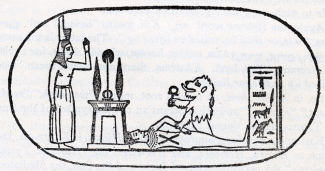
The identity of the legends is also confirmed by this hieroglyphic picture, copied from an ancient Egyptian monument, which may also enlighten you as to the Lion's grip and the Master's gavel.
 in the ancient Phoenician character,
in the ancient Phoenician character,  and in the Samaritan,
and in the Samaritan,  A B, (the two letters representing the numbers 1, 2, or Unity and Duality, means Father, and is a primitive noun, common to all the Semitic languages.
A B, (the two letters representing the numbers 1, 2, or Unity and Duality, means Father, and is a primitive noun, common to all the Semitic languages.It also means an Ancestor, Originator, Inventor, Head, Chief or Ruler, Manager, Overseer, Master, Priest, Prophet.
 is simply Father, when it is in construction, that is, when it precedes another word, and in English the preposition "of" is interposed, as
is simply Father, when it is in construction, that is, when it precedes another word, and in English the preposition "of" is interposed, as  Abi-Al, the Father of Al.
Abi-Al, the Father of Al.Also, the final Yod means "my"; so that
 by itself means "My father.'
by itself means "My father.'  , David my father, 2 Chron. ii. 3.
, David my father, 2 Chron. ii. 3. (Vav) final is the possessive pronoun "his"; and
(Vav) final is the possessive pronoun "his"; and  Abiu (which we read "Abif") means "of my father's." Its full meaning, as connected with the name of Khurum, no doubt is, "formerly one of my father's servants, " or "slaves."
Abiu (which we read "Abif") means "of my father's." Its full meaning, as connected with the name of Khurum, no doubt is, "formerly one of my father's servants, " or "slaves."
 and
and  [2 Sam. v. 11; 1 Kings v. 15; 1 Kings vii. 40]. In Chronicles it is
[2 Sam. v. 11; 1 Kings v. 15; 1 Kings vii. 40]. In Chronicles it is  with the addition of
with the addition of  [2 Chron. ii. 12]; and of [2 Chron. iv. 16].
[2 Chron. ii. 12]; and of [2 Chron. iv. 16]. Khur, means an aperture of a window, a cave, or the eye. Also it means white. In Syriac,
Khur, means an aperture of a window, a cave, or the eye. Also it means white. In Syriac,  .
. also means an opening, and noble, free-born, high-born.
also means an opening, and noble, free-born, high-born.  KHURM means consecrated, devoted; in AEthiopic
KHURM means consecrated, devoted; in AEthiopic  . It is the name of a city, [Josh. xix. 38]; and of a man, [Ezr. ii. 32, x. 31; Neh. iii. 11].
. It is the name of a city, [Josh. xix. 38]; and of a man, [Ezr. ii. 32, x. 31; Neh. iii. 11]. Khirah, means nobility, a noble race.
Khirah, means nobility, a noble race. and
and  and
and  IHU and BAL: followed by the hieroglyphic equivalent
IHU and BAL: followed by the hieroglyphic equivalent  of the Sun-God, Amun-ra. Is it an accidental coincidence, that in the name of each murderer are the two names of the Good and Evil Deities of the Hebrews; for Yu-bel is but Yehu-Bal or Yeho-Bal? and that the three final syllables of the names, a, o, um, make A.'.U.'.M.'. the sacred word of the Hindoos, meaning the Triune God, Life-giving, Life-preserving, Life-destroying: represented by the mystic character
of the Sun-God, Amun-ra. Is it an accidental coincidence, that in the name of each murderer are the two names of the Good and Evil Deities of the Hebrews; for Yu-bel is but Yehu-Bal or Yeho-Bal? and that the three final syllables of the names, a, o, um, make A.'.U.'.M.'. the sacred word of the Hindoos, meaning the Triune God, Life-giving, Life-preserving, Life-destroying: represented by the mystic character  ?
?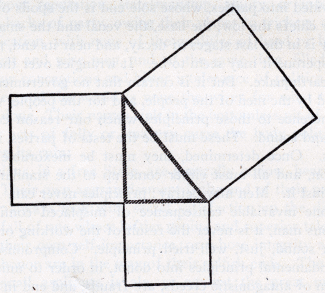
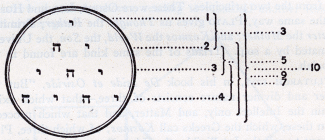
 "I am that I am," is a wretched translation.
"I am that I am," is a wretched translation. and
and  ALOHAYIM, or the Powers, and TSABAOTH, or the starry Armies and their guiding spirits; words also which symbolize the Equilibrium of the Forces of Nature and the Harmony of Numbers. To the three sides of the triangle belong the three great Names
ALOHAYIM, or the Powers, and TSABAOTH, or the starry Armies and their guiding spirits; words also which symbolize the Equilibrium of the Forces of Nature and the Harmony of Numbers. To the three sides of the triangle belong the three great Names  and
and  IAHAVEH, ADONAI, and AGLA. Above the first is written in Latin, Formatio, above the second Reformatio, and above the third, Transformatio. So Creation is ascribed to the FATHER, Redemption or Reformation to the SON, and Sanctification or Transformation to the HOLY SPIRIT, answering unto the mathematical laws of Action, Reaction, and Equilibrium. IAHAVEH is also, in effect, the Genesis or Formation of dogma, by the elementary signification of the four letters of the Sacred Tetragram; ADONAI; is the realization of this dogma in the Human Form, in the Visible LORD, who is the Son of God or the perfect Man; and AGLA (formed of the initials of the four words Ath Gebur Laulaim Adonai) expresses the synthesis of the whole dogma and the totality of the Kabalistic science, clearly indicating by the hieroglyphics of which this admirable name is formed the Triple Secret of the Great Work.
IAHAVEH, ADONAI, and AGLA. Above the first is written in Latin, Formatio, above the second Reformatio, and above the third, Transformatio. So Creation is ascribed to the FATHER, Redemption or Reformation to the SON, and Sanctification or Transformation to the HOLY SPIRIT, answering unto the mathematical laws of Action, Reaction, and Equilibrium. IAHAVEH is also, in effect, the Genesis or Formation of dogma, by the elementary signification of the four letters of the Sacred Tetragram; ADONAI; is the realization of this dogma in the Human Form, in the Visible LORD, who is the Son of God or the perfect Man; and AGLA (formed of the initials of the four words Ath Gebur Laulaim Adonai) expresses the synthesis of the whole dogma and the totality of the Kabalistic science, clearly indicating by the hieroglyphics of which this admirable name is formed the Triple Secret of the Great Work.